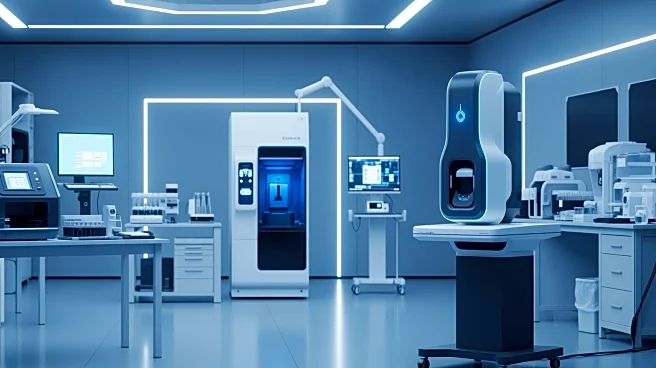What's Happening?
The Asia-Pacific region is projected to experience the fastest growth in the global companion diagnostics market, driven by the increasing cancer burden and expansion of genetic testing services. According to a report by Mordor Intelligence, the rapid
development of localized diagnostic solutions in China, Japan, and India is contributing significantly to this growth. National initiatives aimed at integrating precision medicine into healthcare systems are further bolstering regional demand. The global market for companion diagnostics is expected to surpass $15.62 billion by 2030, growing at a compound annual rate of 12.42%. This expansion is largely attributed to the growing applications of precision medicine and the increasing need for biomarker-based testing.
Why It's Important?
The anticipated growth in the Asia-Pacific companion diagnostics market is significant for several reasons. It highlights the region's increasing focus on precision medicine, which could lead to improved healthcare outcomes through more personalized treatment options. The expansion of genetic testing services and localized diagnostic solutions may enhance early detection and treatment of diseases, particularly cancer, which remains a major health challenge. This growth also presents substantial opportunities for companies involved in the development and distribution of diagnostic technologies, potentially leading to increased investment and innovation in the sector. As the market expands, stakeholders in the healthcare industry, including policymakers and healthcare providers, may need to adapt to new technologies and practices to meet the rising demand.
What's Next?
The continued integration of precision medicine into healthcare systems across the Asia-Pacific region is likely to drive further demand for companion diagnostics. As countries like China, Japan, and India continue to develop localized solutions, there may be increased collaboration between governments, healthcare providers, and diagnostic companies to enhance the availability and accessibility of these technologies. Additionally, the projected growth in the global market suggests that companies may focus on expanding their presence in the Asia-Pacific region, potentially leading to increased competition and innovation. Policymakers may also need to consider regulatory frameworks to support the safe and effective use of companion diagnostics.
Beyond the Headlines
The growth of the companion diagnostics market in the Asia-Pacific region could have broader implications for global healthcare practices. As precision medicine becomes more prevalent, there may be ethical considerations regarding data privacy and the use of genetic information. Additionally, the focus on biomarker-based testing could lead to shifts in how diseases are diagnosed and treated, potentially influencing healthcare policies and practices worldwide. The expansion of this market may also drive advancements in related fields, such as biotechnology and pharmaceuticals, further shaping the future of healthcare.















